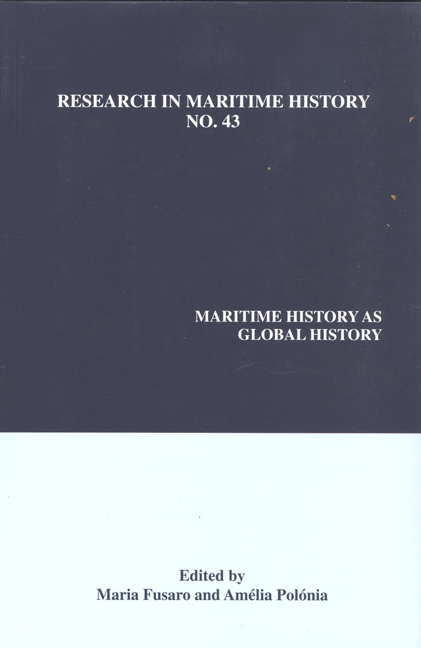Book contents
- Frontmatter
- Contents
- About the Editors
- Contributors' Notes
- “Maritime History: A Gateway to Global History?”
- “Behind the Atlantic Expansion: Flemish Trade Connections of Seville in 1620”
- “National and International Labour Markets for Sailors in European, Atlantic and Asian Waters, 1600-1850”
- “Maritime Expansion and (De)globalization? An Examination of the Land and Sea Trade in Seventeenth-Century Mughal India”
- “From Hold to Foredeck: Slave Professions in the Maritime World of the East India Company, c. 1660-1720”
- “Small Town Merchants, Global Ventures: The Maritime Trade of the New Julfan Armenians in the Seventeenth and Eighteenth Centuries”
- “Lighting up the World? Empires and Islanders in the Pacific Whaling Industry, 1790-1860”
- “Technological Advances in the Maritime Sector: Some Implications for Trade, Modernization and the Process of Globalization in the Nineteenth Century”
- “Lost in Calculation? Norwegian Merchant Shipping in Asia, 1870-1914”
- “Why Are the Major Oil Companies Selling Off their Fleets? The Case of Total”
- “Turning Maritime History into Global History: Some Conclusions from the Impact of Globalization in Early Modern Spain”
- “Maritime History as Global History? The Methodological Challenges and a Future Research Agenda”
“Lighting up the World? Empires and Islanders in the Pacific Whaling Industry, 1790-1860”
- Frontmatter
- Contents
- About the Editors
- Contributors' Notes
- “Maritime History: A Gateway to Global History?”
- “Behind the Atlantic Expansion: Flemish Trade Connections of Seville in 1620”
- “National and International Labour Markets for Sailors in European, Atlantic and Asian Waters, 1600-1850”
- “Maritime Expansion and (De)globalization? An Examination of the Land and Sea Trade in Seventeenth-Century Mughal India”
- “From Hold to Foredeck: Slave Professions in the Maritime World of the East India Company, c. 1660-1720”
- “Small Town Merchants, Global Ventures: The Maritime Trade of the New Julfan Armenians in the Seventeenth and Eighteenth Centuries”
- “Lighting up the World? Empires and Islanders in the Pacific Whaling Industry, 1790-1860”
- “Technological Advances in the Maritime Sector: Some Implications for Trade, Modernization and the Process of Globalization in the Nineteenth Century”
- “Lost in Calculation? Norwegian Merchant Shipping in Asia, 1870-1914”
- “Why Are the Major Oil Companies Selling Off their Fleets? The Case of Total”
- “Turning Maritime History into Global History: Some Conclusions from the Impact of Globalization in Early Modern Spain”
- “Maritime History as Global History? The Methodological Challenges and a Future Research Agenda”
Summary
And thus have these naked Nantucketers, these sea hermits, issuing from their ant-hill in the sea, overrun and conquered the watery world like so many Alexanders; parcelling out among them the Atlantic, Pacific, and Indian oceans, as the three pirate powers did Poland. Let America add Mexico to Texas, and pile Cuba upon Canada; let the English overswarm all India, and hang out their blazing banner from the sun; two thirds of this terraqueous globe are the Nantucketer's.
On the outside walls of the Whaling Museum in New Bedford, Massachusetts, a stone-carved inscription proclaims the success of the whaling industry in “lighting up the world.“ This claim is literal in that it describes how whaling provided the oil that fuelled the street lamps of Europe's cities and powered many other facets of the Industrial Revolution. But it is also metaphorical in its suggestion that the industry expanded European and American understanding of the geography, resources and cultures of the world's remote oceans, while at the same time exposing those cultures to the “light” of European expansion and global capitalism. In more recent times, the same claims have been taken up by historians under the rubric of globalization. Thus, Granville Allen Mawer in his history of South Seas whaling celebrates ocean-going sperm whalers as pioneers who “broke whaling out of the ice of the North Atlantic and led it south to become the world's first truly global industry.“
This essay re-examines the link between whaling and globalization from the perspective of those whom Eric Wolf famously called “the people without history.“5 In the case of Pacific whaling these were Maori, Native Hawaiians and other indigenous islanders, many of whom encountered Europeans for the first time in the context of whaling and other maritime resource industries. The essay is not, however, an exhaustive account of indigenous engagement with whaling in all parts of the Pacific. Rather, it is an exploratory piece that aims to open up the conversation on whaling and globalization and to suggest avenues for further research. Using case studies from New Zealand and Hawai'i, I show how a focus on global connections can shed new light on the relationship between maritime industries and broader world-historical processes, such as colonialism and cultural contact.
- Type
- Chapter
- Information
- Maritime History as Global History , pp. 159 - 176Publisher: Liverpool University PressPrint publication year: 2010



